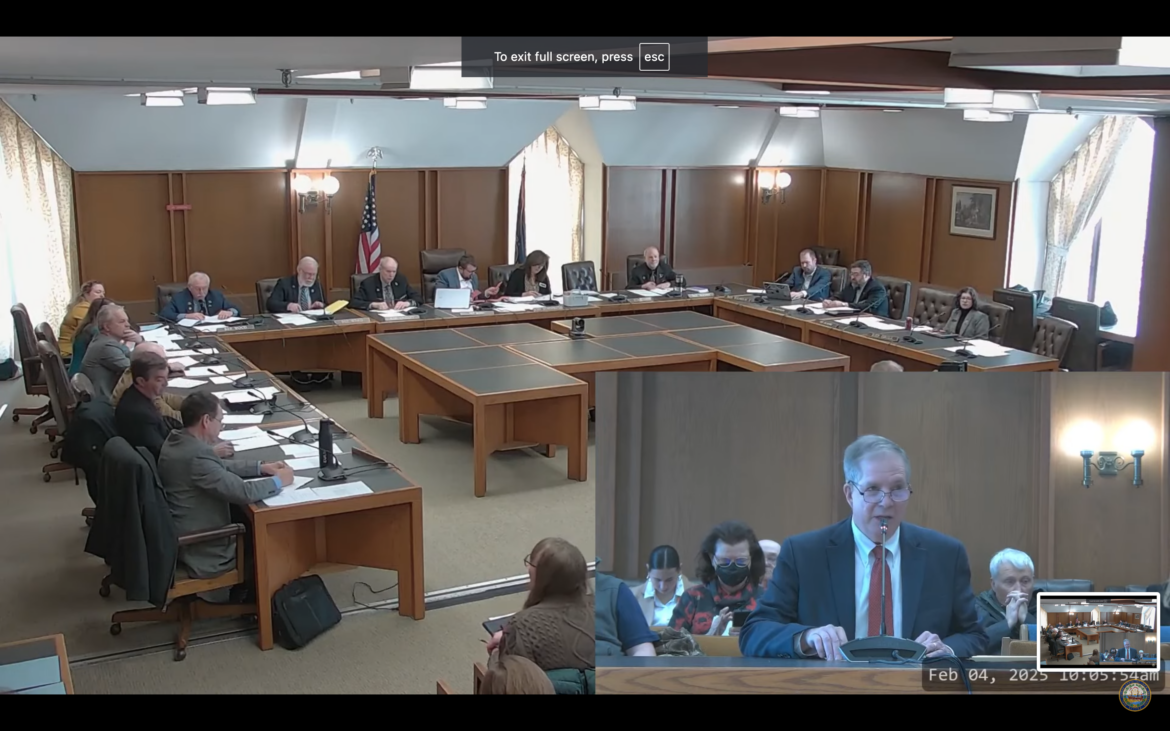By GARRY RAYNO, InDepthNH.org
CONCORD — Let the people decide if they want no-excuse absentee ballot voting instead of legislators, the bill’s sponsor told a House Committee Tuesday.
Rep. Connie Lane, D-Concord, told the House Election Law Committee that 37 other states, controlled by both parties, issue absentee ballots to voters without having to state a reason.
“We need to listen to the people, the vast majority of people in New Hampshire and across the country support no-excuse absentee ballots,” Lane said. “Let the people decide instead of us deciding what they want.”
Secretary of State David Scanlan did not take a position on CACR 5, a proposed constitutional amendment that would allow any registered voter to request an absentee ballot without giving a reason.
He noted the constitution has been amended a number of times with absentee voting, but the changes in the past were a matter of necessity such as being out of town or unable to go to the polls because of a disability.
“The proposed change goes from a matter of necessity to a matter of convenience,” Scanlan said. “You simply don’t want to get up in the morning and go to the polling place.”
He noted that is a policy decision but the other side needs to be addressed if you want to make the change.
“On the one hand, everybody in this room believes it is important that everyone who is qualified to vote have the opportunity to do that in a fairly easy way,” Scanlan said. “On the other side, you have a right to know that those who participate in an election are qualified.”
He noted the easier you make it to vote, the more you have to back off security, but if you are too extreme with security it becomes voter suppression.
“You need to find that sweet spot in the middle if you are going to change the constitution for easier voter access,” he said. “You have to have an expectation the voter will be willing to provide their qualifications.”
He was asked if the state had found the sweet spot, he noted, it tends to move depending on the party in control, but that voters have high confidence in elections here and the state has maintained that over a sustained time.
New Hampshire is one of only two states that has a traditional election process, Scanlan noted, without systems like early voting or vote by mail, while the other states are “all over the map.”
A number of people and representatives from organizations advocating for those with disabilities or voter engagement testified in favor of the proposed constitutional amendment, that would require a three-fifths vote of the House and of the Senate to place the measure on the next general election ballot in 2026.
David Trumble of Weare said voting is not only a fundamental right, it is the underpinning of all fundamental rights.
He noted the Election Law Journal ranks New Hampshire 50th in the country as the most difficult state in which to vote.
“When you are at the bottom,” he said, “you are not looking at a sweet spot.”
An article by a Columbia Law School professor indicates that it is almost impossible to have voter fraud with absentee ballots, because of the procedures, he said.
Trumble noted when states are too strict they disenfranchise voters, often minority voters.
Krysten Evans, director of policy and advocacy for Able NH, an advocacy group for those with disabilities, said absentee voting is the most reliable and accessible means for their members to vote.
“The current system creates an undue burden for those who seek equal access to the ballot box,” Evans said. “A right should not depend on a person’s health, or disability or physical restrictions.”
It is a matter of equity and justice to recognize need as other states do, she said. “No voter should have to justify their need in order to take a ballot.”
Kaylie Efstratiou
, Public Policy Fellow 2025, from the University of New Hampshire spoke in favor of the proposed amendment on behalf of Open Democracy NH, noting changes made to absentee voting during the COVID pandemic produced 60,000 more voters than in the previous presidential election.
“In the live free or die state, why should any voter provide a reason to take an absentee ballot,” she asked.
Jean Barnes, the moderator for Ward 2 in Concord, noted the rules for processing absentee ballots were also changed for the pandemic, but are no longer in place.
If they are not revised again and the proposed constitutional amendment is approved, Barnes said, it would be impossible to process all the absentee ballots within the current guidelines and meet deadlines for posting results.
Henry Klementowicz, deputy legal director at the American Civil Liberties Union of New Hampshire, said historically about 9 percent of voters voted absentee, and that figure went to 30 percent in 2020.
“You’re not going to see a dramatic overnight shift,” he said. “What you will see is reduced lines election day, and you may need a few less election officials.”
He said the state has a robust process for validating absentee voting which is all done in public.
“This is about moving New Hampshire elections into the 20th Century and maybe into the 21st Century,” Klementowicz told the committee, which did not make an immediate decision on the proposed constitutional amendment.
According to the House electronic filing system, 179 were in favor of the bill, and 78 opposed it. In the committee room, eight people appeared in support of the bill and one was opposed.
Garry Rayno may be reached at garry.rayno@yahoo.com.





